Current Residents
Class of 2026
Brook Byrd, PhD
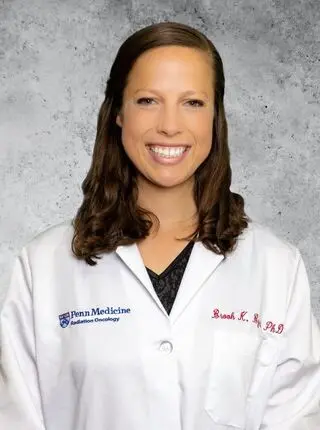
My family is from Williamsburg, Virginia, an 18th century colonial town located in southern Virginia. I completed my BS in Applied Physics with a minor in Ethical Leadership studies at Christopher Newport University in 2017. During my time at CNU, I played collegiate tennis, led multiple community service trips, and performed nuclear detector research at the nearby Thomas Jefferson National Accelerator facility, a national lab also located in Newport News, Virginia. With a strong passion for bridging science with service, I pursued a UK-US Fulbright Fellowship in Radiotherapy, and explored virtual radiotherapy training opportunities (VERT), 3D visualization solutions for CBCT/CT image matching, and methods for improving Radiotherapy education within the UK. This highly cross-cultural Fulbright exchange also provided me with a wider global perspective, humility, and empathy; which continues to shape my actions today. Penn’s shared interest in cross-cultural communications and global collaboration is another leading factor for why I choose to be a part of this program.
After moving back to the US, I pursued a PhD in engineering at the Thayer School of Engineering at Dartmouth College with a certificate in Medical Physics and Surgical Innovation. My doctoral research at Dartmouth spanned multiple fields and I’ve been lucky to work with surgeons, radiologists, pathologists, oncologists, technicians, research scientists, and many mentors along the way. Over the 5 years of my PhD career, I was involved in over a dozen preclinical imaging collaborations and four major clinical studies. My research also supported a start-up breast cancer surgical guidance company, CairnSurgical Inc., in multiple clinical trials which aimed to make supine MRI an efficient and cost-effective imaging strategy for breast cancer surgical guidance.
Through these clinical experiences, I discovered a deep passion for patient care and a strong motivation to improve lives through clinical work. With interest in the intersections of clinical practice, scientific advancements, and commercial translation, I’m excited to remain involved in all three spheres during my time here as a 3-yr research resident. When I’m not in the clinic, I’m an avid swimmer, runner, and world-traveler.
Megan Chesal, PhD
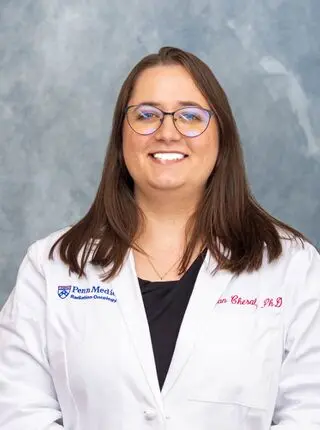
I was raised in the small town of Natchitoches (pronounced Nack-a-tish) in northern Louisiana before moving to Baton Rouge to attend Louisiana State University (LSU). After graduation, I received a BS in physics and entered the Medical Physics Graduate program. My master’s research was focused on using advanced computational tetrahedral-type phantoms to assess the radiation dose distribution to astronauts on the International Space Station. I continued at LSU for my PhD research, where my dissertation dealt with the development of cosmic ray generators to replicate the radiation dose distribution of astronauts in mice for ground-based space radiobiology studies. I have a strong interest in the use and advancement of ions in radiation therapy, as well as the continued education of the public and students on the applications of radiation and medical physics. I enjoy listening to music, baking breads and desserts, hiking, and writing fantasy stories in my free time.
Yin Gao, PhD
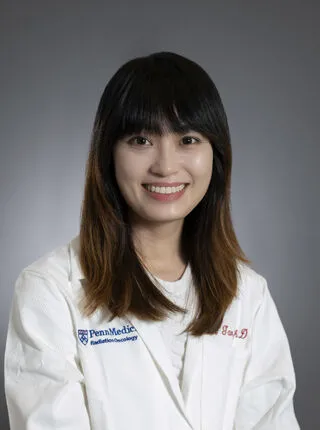
Chief Education Officer
I was born and raised in Yangzhou, China, and moved to the United States in high school. I received a bachelor’s degree in health science from Stony Brook University. Upon graduation, I began working as a certified medical dosimetrist at Boston Medical Center to design radiation therapy plans for cancer patients. Driven by my passion for radiotherapy, I pursued further studies and earned a master’s degree in medical physics from Duke University. My passion for research development later let me join UT Southwestern Medical Center to pursue PhD training. With a unique perspective as a former dosimetrist, my doctoral research focused on developing and integrating an intelligent automatic treatment planning framework. Utilizing cutting-edge artificial intelligence techniques, I aim to enhance the quality of radiotherapy plans, improve planning efficiency, and reduce quality variations. In my free time, I enjoy snowboarding, playing tennis, and piano.
Bolin Li, MS

My journey began in Tianjin, China, where I was born and raised before moving to the U.S. at the age of eight. Growing up in Ann Arbor, Michigan, I pursued my undergraduate degree in physics and biophysics at the University of Michigan. Subsequently, I began my graduate studies at the University of Pennsylvania and received an MS in medical physics. During this time, I worked on integrating advanced AI techniques, such as large language models (LLMs), into clinical practice. My research was focused on automating breast cancer staging using LLMs with different prompting frameworks. I am driven by a keen interest in leveraging emergent AI technologies to enhance clinical processes. Beyond my research, I am passionate about contributing to the growth of others by serving as an educator and mentor. In my spare time, I really enjoy swimming, cooking different cuisines, and exploring the food and city scene with my friends.
Maksym Sharma, PhD

Chief Resident
I grew up splitting my time between a small village outside Lviv, Ukraine, and Moscow, Russia. I moved to Canada, where I completed my undergraduate studies at the University of Toronto and earned a BSc degree in Biomedical Physics, with minors in Chemistry and Biology. After graduating, I was awarded the Harold E. Johns studentship, which I held at the Carlo Fidani Regional Cancer Centre in the summer of 2019. I then moved to London, Ontario, where I earned my PhD in Medical Biophysics from the University of Western Ontario. My doctoral thesis focused on the development of texture analysis and machine learning algorithms to predict clinical outcomes and quantify structural and functional changes occurring in the lungs of ex-smokers with and without COPD. I am interested in directly impacting patient care by developing emerging technologies, applying radiomics tools, and translating research advancements into safe and effective clinical applications. In my free time, I enjoy playing table tennis, football/soccer, chess, swimming, and I love to travel around the world and enjoy hiking with friends.
Class of 2027
Erika Bilokon, MS
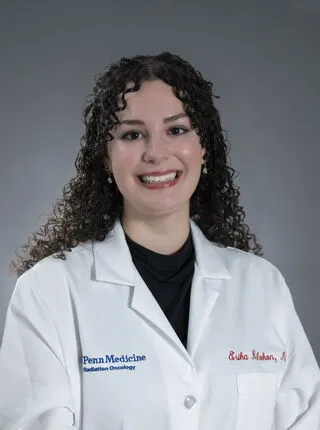
I was born and raised in Virginia Beach, Virginia with my two siblings. I earned my B.S. in Applied Physics from Christopher Newport University, where I minored in mathematics and Leadership Studies in completion of the President Leadership Program. During undergrad, I was involved in various clubs and organizations and participated a study abroad focusing on mathematics and physics at the time of the French Revolution. My research capstone project focused on infrared cameras for hyperthermia treatments. I went on to complete my master's in medical physics at the University of Pennsylvania, where my thesis centered on isocenter optimization for single isocenter multiple metastases Linac-based SRS. Through clinical improvement projects, I discovered my passion for being part of a patient care team. Outside of the clinic, I love baking, traveling, reading, and painting. I also enjoy staying active through hiking, swimming, skiing, and exploring the city.
Madelyn Johnson, MS
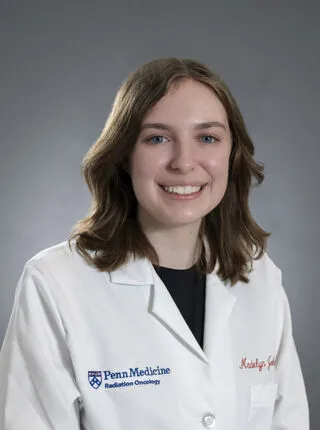
I am originally from Peoria, Illinois and attended college at the University of Northern Iowa in Cedar Falls where I received my BS in physics and minored in French. I then joined the University of Pennsylvania’s Medical Physics Graduate Program where I received my MS in medical physics. My thesis research focused on photodynamic therapy (PDT) and singlet oxygen luminescent dosimetry (SOLD) in mouse models. Interested in clinical research, I pursued opportunities to work on treatment planning projects during my time in the graduate program as well. This experience helped me realize my passion for clinical work and patient care. I am interested in education and outreach within this field and hope to grow as a mentor throughout my residency. Outside medical physics, I spend my time watching movies, baking, knitting/crocheting, and exploring Philly with my friends.
Jacob Sunnerberg, PhD
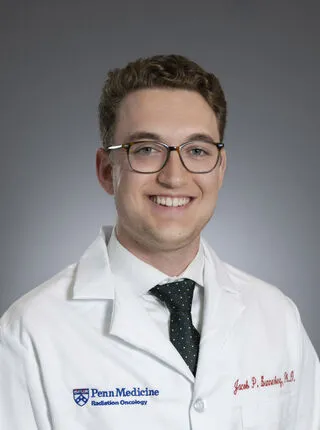
I grew up in Amesbury, MA and have been a lifelong New Englander. I completed my BS in Physics at Tufts University, where I began my research career in biophysics studying neuronal growth and cellular mechanics. I then received my PhD in Engineering Sciences from Thayer School of Engineering at Dartmouth College as a part of the Medical Physics Education Program.
My doctoral research under Dr. Brian Pogue focused on understanding the mechanisms underlying FLASH radiotherapy, specifically the role of oxygen in ultra-high dose rate radiation delivery. What excited me most was the translational nature of this work. I conducted systematic studies progressing from in vitro protein solutions to in vivo murine models, directly linking radiation chemistry to biological outcomes. I also had the opportunity to apply UHDR radiation therapy in clinical veterinary cases, providing hands-on experience with curative treatments.
Through my research and clinical exposure, I developed a passion for translating novel techniques into clinical practice to improve patient outcomes. I'm particularly drawn to the intersection of cutting-edge physics research and direct patient care, where innovative approaches can make a meaningful difference in treatment effectiveness and safety. I'm excited to continue this translational focus during my residency at Penn.
Outside of work, I love skiing, hiking, and really anything that gets me outdoors. I'm also an avid reader and have played guitar most of my life, which has always been my creative outlet.
Xin Tie, PhD
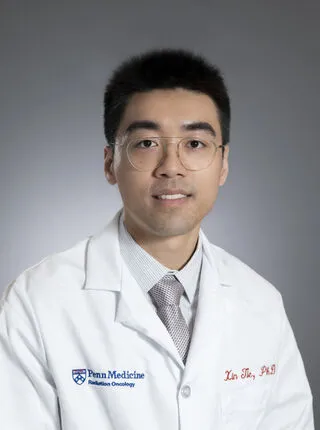
I was born and raised in a medium-sized city in southeastern China. I earned my bachelor’s degree in Physics (Biophysics) from the Kuang Yaming Honors School at Nanjing University. I then moved to the United States to pursue my PhD in Medical Physics (minor in Computer Science) at the University of Wisconsin-Madison. My doctoral research centers on the application of artificial intelligence (AI) in medical imaging and radiation therapy. My early work spanned a diverse range of topics, including synthetic CT generation for MRI-guided radiation therapy, COVID-19 pneumonia classification using Chest X-rays, and spectral CT reconstruction. In the latter half of my PhD, my focus narrowed to leveraging longitudinal PET imaging and AI to improve clinical lymphoma management. Specifically, my work included developing novel methods for automated tumor quantification and response assessment, conducting multicenter validation of quantitative imaging biomarkers for outcome prediction, and designing AI algorithms for target volume delineation in radiation treatment planning. I also contributed to the development of large language models and multimodal models for clinical nuclear medicine applications. With a strong interest in translating computational innovations into clinical practice, I’m passionate about bridging research and patient care to facilitate personalized cancer management through advanced therapy, imaging, and AI techniques. I’m particularly drawn to Penn Medicine for its solid clinical training, supportive environment, and exceptional alumni network. Outside of work, I enjoy traveling, hiking, weightlifting, swimming, and exploring museums of all kinds.
Weibing Yang, PhD
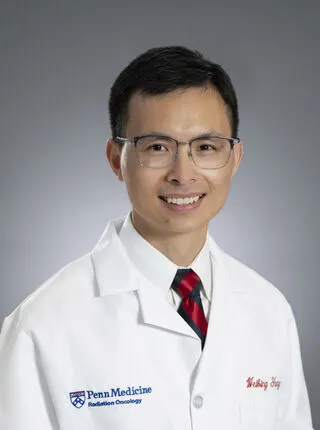
I completed my bachelor’s degree in applied physics at Northeastern University in Shenyang, Liaoning, China, followed by a master’s degree in engineering. I then pursued a Ph.D. in Physics at Temple University in Philadelphia, which was a deeply rewarding and formative experience that helped shape my analytical thinking. Driven by a passion for applying physics to improve human health, I completed a certificate program in Medical Physics at the University of Pennsylvania and conducted postdoctoral research with Dr. Timothy Zhu, focusing on photodynamic therapy. I am currently enrolled in the three-year Medical Physics Residency Program at Penn. Beyond my academic and professional pursuits, I enjoy reading history, psychology, and religious texts. I am also deeply interested in non-medical approaches to health and healing, such as Qigong, traditional Chinese medicine, massage, and cupping therapy.

